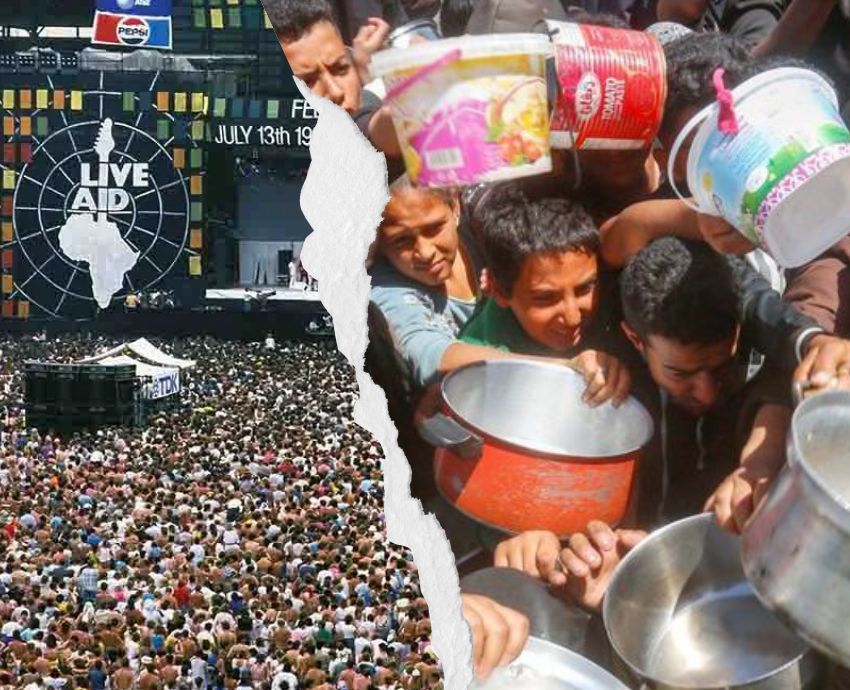
Forty years ago, British journalist Michael Buerk’s BBC reports on the “biblical” famine in Ethiopia aroused the conscience of the world. Among those watching was musician Bob Geldof, who channelled his shock at images of emaciated, hollow-eyed children into the charity single “Do They Know It’s Christmas?” and its concert counterpart Live Aid. Viewed by 1.5 billion people in 50 countries, the latter was billed as a “global jukebox” and, despite various criticisms, raised more than US$127 million for famine relief.
Recently reflecting on Live Aid’s 40th anniversary, Buerk attributed the event’s success to Geldof’s ability to fuse the “sympathies and intentions” of the West with the suffering of the developing world.
As new documentaries and even a stage musical mark the passage of four decades since that momentous day, another humanitarian catastrophe is unfolding before our eyes. In Gaza, where since March Israel has imposed a blockade on all supplies, 2.3 million people have been at risk of famine.
In late June, as Israel closed crossings into the north of the territory — cutting off the major route for aid to reach hundreds of thousands of people — that risk began to materialise. This week, Gazan health officials reported that at least 15 Palestinians, including four children, had starved to death in a single day.
Every time a Gazan presents at one of the few aid points in the strip — all located in evacuation zones civilians have been ordered to leave, and which are only open for a few minutes at a time — they risk being gunned down by Israeli troops. More than 1000 such killings have been perpetrated since the end of May.
To turn on the news or scroll social media is to be assailed with images from Gaza reminiscent of Buerk’s reports on the Ethiopian famine, which he famously likened to “hell on Earth”. Malnourished teenagers sprawl on makeshift beds, looking half their age. Cheekbones and shoulder blades jut out like knives. Eyes, rounded and glassy amid skeletal faces, boggle vacantly from their sockets. In one widely shared image, a mother cradles her 18-month-old baby, his skin falling away from ribs and spine.
In the face of such horror, the moral inertia and outright cowardice of the West is stark. The Australian government, which significantly increased its humanitarian efforts in the aftermath of Live Aid, merely tut-tuts. Foreign minister Penny Wong equivocates when pressed on the causes of the famine. Prime Minister Anthony Albanese refuses to join his French and British counterparts in calling for Palestinian statehood. Amir Maimon, Israel’s ambassador to Australia, is warmly welcomed by our institutions rather than expelled.
Instead of confronting the crisis head-on, our parliamentarians clutch their pearls over a senator holding up a sign calling for sanctions against Israel. This, as ever, is where the true outrage lies — not in response to the preventable starvation of children, but to the spelling out of Israel’s seemingly boundless crimes. That Israel continues to deny the famine in Gaza — even as the United Nations’ World Food Program explicitly likens the conditions it has created to Ethiopia in the 1980s — only compounds the heinousness of its conduct.
There is almost no serious scholar of genocide left who believes what Israel is doing is anything other than the deliberate and systematic destruction of the people of Gaza —genocide. Yet, it is a word we cannot speak. The veneer of civility must be maintained at all costs, even as children waste away to nothing in their parents’ arms.
Even the reporters whose job it is to communicate these atrocities to the world are now themselves at risk of dying from hunger. We are told all this suffering is necessary to destroy terrorism — a goal as nebulous as it is disingenuous.
Israeli Prime Minister Benjamin Netanyahu knows as well as anyone that the slaughter in Gaza, far from eliminating the threat posed to Israel by Islamist and other terrorists, is seeding it for generations to come. The grief and enmity unleashed in the months since the October 7, 2023, attacks can only metastasise, even if the last card-carrying Hamas militant is blown to pieces tomorrow.
What will it take for the so-called “international community” to act on — not merely hand-wring about — Israel’s brutalisation of Gaza? What has it to fear, apart from the usual vexatious claims of antisemitism, from the application of maximum pressure through sanctions, the severing of diplomatic ties and the immediate and total cessation of the supply of materiel?
Australia, of course, could not go it alone — but it could choose to take a principled stand against a regime as openly murderous as any we have seen fit to confront. Our condemnations of Israel’s crimes will do nothing to arrest them. They are merely elegies for Gazan children to die to.
Whatever the limitations of Geldof’s monetaristic approach to famine relief in Ethiopia, thousands of lives were likely saved as a result. Bringing about justice in Palestine will, however, require far more than charity.
As Geldof himself has said, what is needed now is “proper politics”, adding that “unfortunately the bravery of that simply isn’t around now”. He is right. It is to our lasting disgrace that, faced with horrors unseen in a generation, our courage could extend no further than a tremulous murmur of disapproval.
[Ben Brooker is a writer, editor, critic, playwright, essayist and dramaturg whose work has appeared in the Guardian, Overland, ABR, Crikey, the Saturday Paper and elsewhere.]